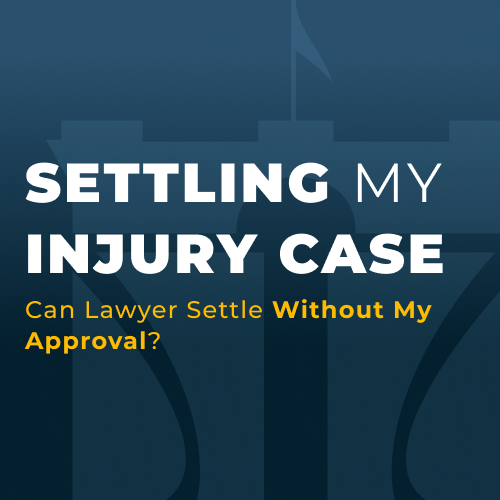
You hire a lawyer to represent your interests and help you pursue the maximum compensation possible. While your attorney runs your case and handles all negotiations, you’re still the client.
That means your attorney cannot resolve your case without you agreeing to the settlement. The final settlement decision always rests with you.
It is essential to understand your lawyer’s role in the settlement process and the limitations they face.
Can an Attorney Agree to Settle a Claim Without Client Approval?
A lawyer can settle a personal injury claim only with their client’s approval. Settling a claim means you need to sign a release of all claims extinguishing any future claims arising from this same incident. Only you, the injured victim, can make that decision. The release of all claims must have your signature. Lawyers cannot sign on your behalf as it would violate their ethical obligation to you. That means you need to fully understand the terms of the agreement and the consequences of signing it before proceeding.
Settlement agreements are legally binding contracts in nearly all instances. You’re giving up your legal right to take any further legal actions. Your attorney must explain how settling now impacts your future ability to pursue compensation. That’s especially important if you are not fully healed at the time of settlement.
Once you agree to a settlement, the defendant’s insurance adjuster will send a release of all claims. Your attorney will review the release and have you sign it. The insurance company will issue your settlement check once the release is received. Your attorney will deposit the check in their trust account, where they pay any outstanding liens, take their fees, and cut you a check for your portion of the settlement.
American Bar Association Rules
The American Bar Association sets forth rules that say a lawyer can settle a case only if they inform and obtain the consent of their client. Should an attorney violate this rule, they risk suspension or even disbarment. Most attorneys will not risk their livelihood to settle a case without informing their client.
Rule 1.8 prohibits your lawyer from:
- Entering into a transaction with a client unless the terms are fair and reasonable and the lawyer fully discloses the terms of the agreement in an easy-to-understand manner.
- Accepting compensation for representing a client from anyone other than the client without the client’s consent.
You have legal options if you suspect your attorney has acted in bad faith. However, agreeing to a settlement and changing your mind is not bad faith. Your attorney communicated the offer, and you accepted it. Sometimes, your attorney might ask you to confirm a settlement range you’re willing to take. Suppose you’ve given your attorney written authorization to resolve the case within a specific range, and they commit to a settlement. In that case, you cannot argue you disagree with the settlement.
Contact Attorney Anthony A. Ferrante Today
If you need assistance with a personal injury settlement in New York, please get in touch with Anthony A. Ferrante. Mr. Ferrante has over a decade of experience representing injured victims in New York. Schedule an initial consultation and learn how he can assist you in pursuing the maximum compensation possible.

















